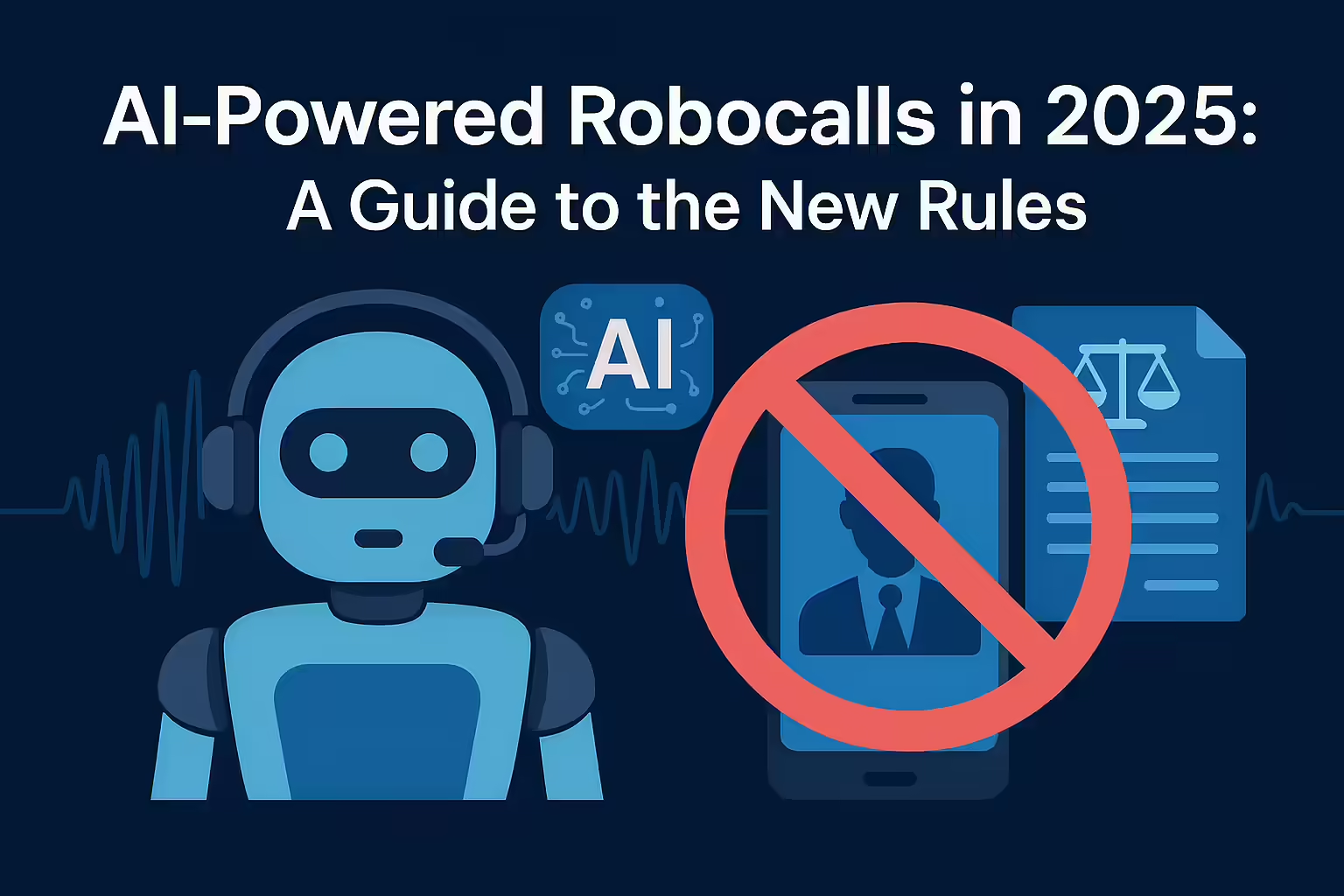What's Happening with AI Robocalls in 2025
If your outbound sales team uses any form of automated calling technology—or is considering AI-powered voice solutions—2025 marks a critical turning point in telecommunications compliance.
The regulatory landscape around AI robocalls has fundamentally shifted, with the FCC taking aggressive action to restrict AI-generated calls and impose severe penalties on violators. What was once a gray area is now clearly defined: AI robocalls without proper consent are illegal, and the consequences for non-compliance are substantial.
This comprehensive guide breaks down everything outbound sales teams need to know about the current state of AI robocall regulations, recent enforcement actions, and how to maintain compliance while still running effective calling campaigns.
The FCC's Landmark Ruling on AI-Generated Calls
In February 2024, the Federal Communications Commission (FCC) issued a declaratory ruling that fundamentally changed the legal status of AI-generated robocalls. This wasn't new legislation—it was a clarification that AI-generated voice calls fall squarely under existing TCPA restrictions on "artificial or prerecorded voice" calls.
What the Ruling Means
The FCC's ruling established that:
- AI-generated calls are robocalls: Any call using artificial intelligence to generate a human voice is considered a "robocall" under the Telephone Consumer Protection Act (TCPA)
- Prior express written consent is required: Before making AI-generated calls to mobile phones or residential lines, callers must obtain specific written consent from the recipient
- No exceptions for "conversational" AI: Even if the AI can respond dynamically to questions, it's still considered a robocall requiring consent
- Immediate effect: The ruling took effect immediately upon publication, with no grace period for companies to adjust their practices
Why This Matters for Sales Teams
Many sales organizations had been operating under the assumption that AI-powered calling tools existed in a regulatory gray area. The FCC's ruling eliminated any ambiguity: if you're using AI to generate voice content in your calls, you need the same level of consent required for traditional robocalls.
This means that sales teams using AI voice technology must:
- Obtain prior express written consent before calling mobile numbers
- Maintain detailed records of consent
- Provide clear opt-out mechanisms
- Ensure all calls comply with Do Not Call registry requirements
Proposed New Rules: The Future of AI Call Consent
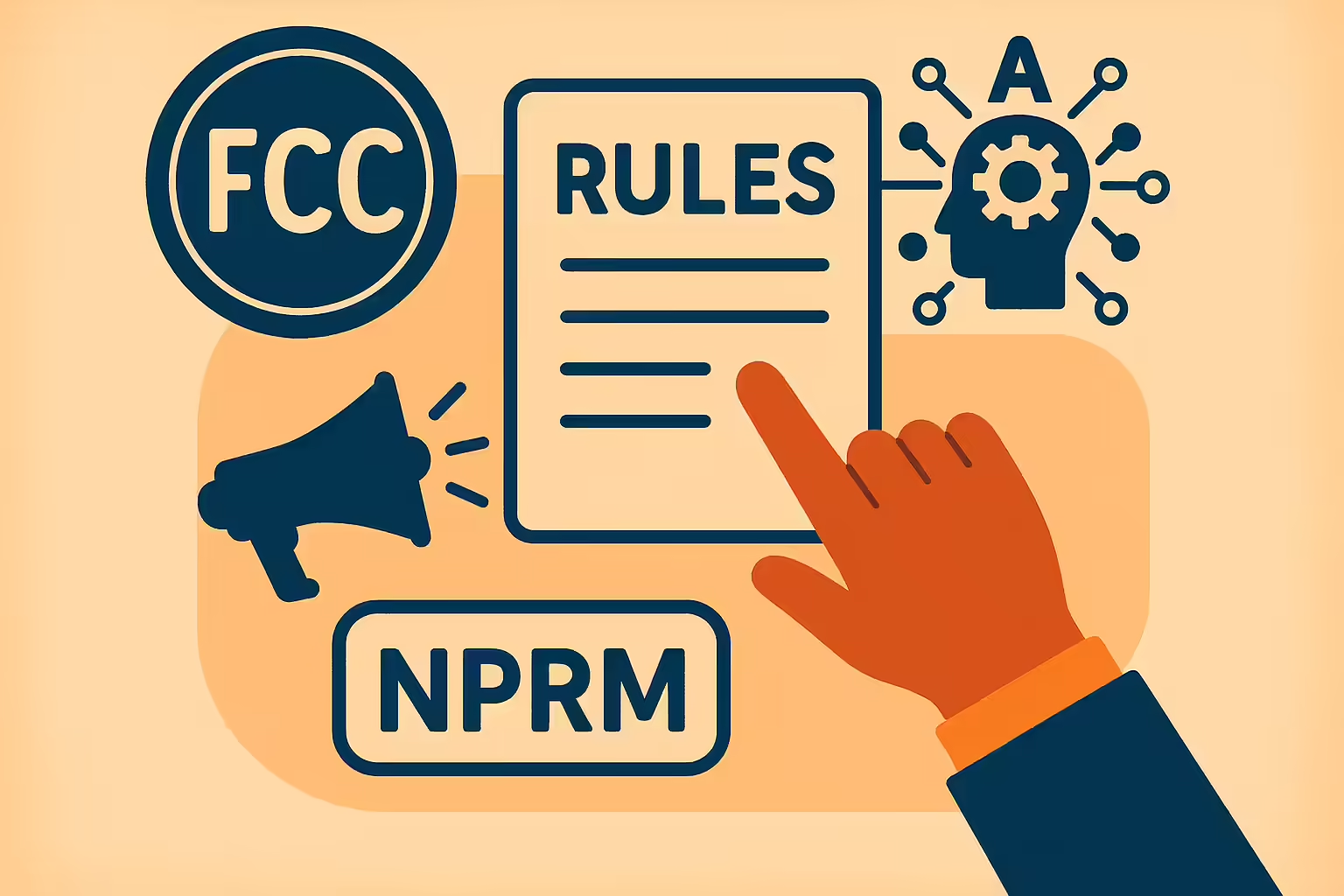
The FCC didn't stop with the February 2024 ruling. In July 2024, the Commission proposed even stricter requirements specifically targeting AI-generated calls and texts. If adopted, these rules would create a new, higher standard of consent for AI communications.
Key Provisions of the Proposed Rules
Enhanced Disclosure Requirements
Under the proposed rules, companies would need to:
- Explicitly disclose AI use: Consent forms must clearly state that calls or texts will be generated using artificial intelligence
- Separate AI consent: Consent for AI-generated communications must be obtained separately from consent for human-made calls
- Plain language requirements: Disclosures must use clear, understandable language—no burying AI use in dense legal text
- Prominent placement: AI disclosures cannot be hidden in footnotes or fine print
What "Separate Consent" Means in Practice
The proposed separate consent requirement is particularly significant. It means you cannot simply add AI calls to a general consent form. Instead, you would need something like:
Example Compliant Consent Language:
☐ I consent to receive calls from [Company Name] using artificial intelligence technology to generate voice messages.
☐ I consent to receive standard marketing calls from [Company Name] made by human representatives.
This separate opt-in requirement would make it much harder to obtain blanket consent for all types of calling, and would require companies to be transparent about their use of AI technology.
Timeline and Status
As of January 2025, these enhanced rules are still in the proposed stage. The FCC has solicited public comments and is reviewing feedback before finalizing the regulations. However, the direction is clear: the regulatory trend is toward stricter requirements and greater transparency around AI use in telecommunications.
Smart compliance teams are already preparing for these rules to take effect by:
- Reviewing and updating consent forms to include AI-specific language
- Implementing systems to track separate AI consent
- Training sales teams on the importance of transparent AI disclosure
- Evaluating whether AI calling technology is worth the additional compliance burden
Major Enforcement Actions: What Happens When You Don't Comply
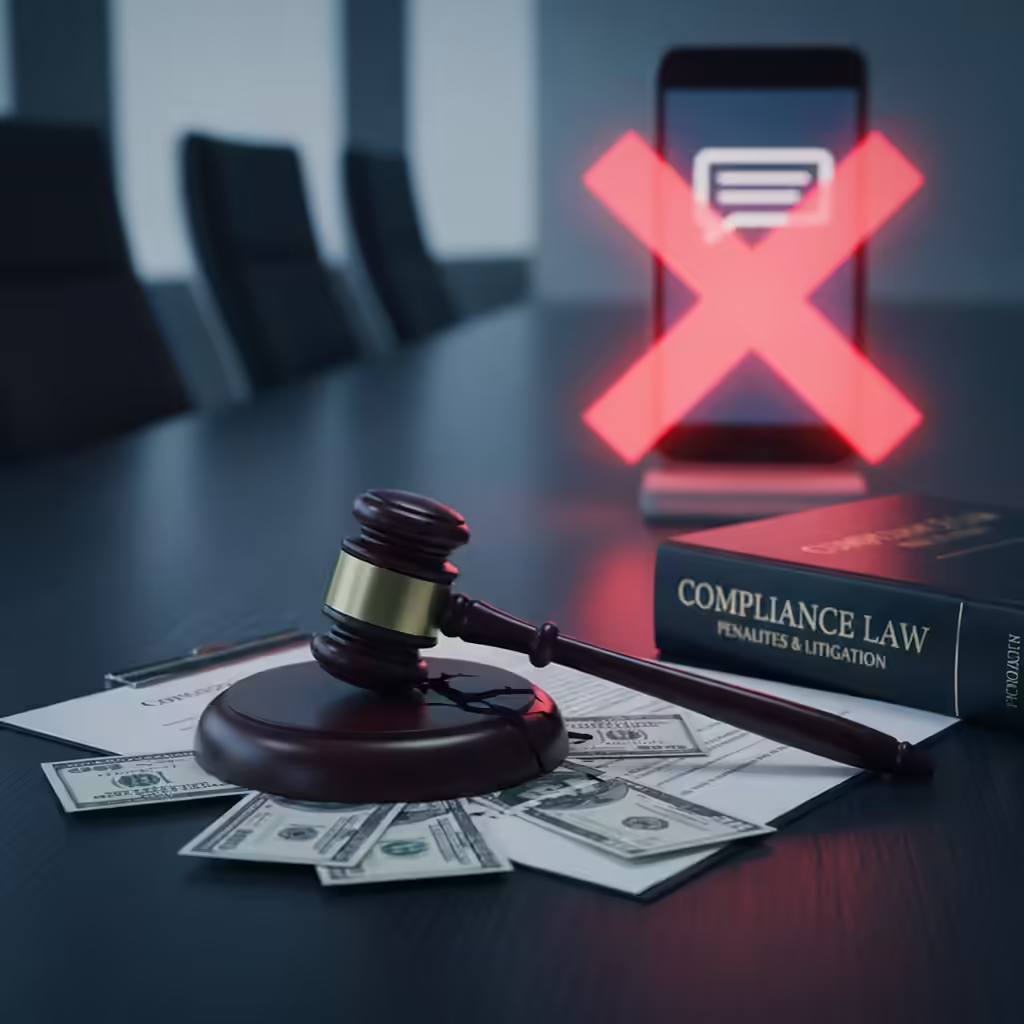
The FCC and FTC haven't just been making rules—they've been actively enforcing them with significant penalties. Recent enforcement actions demonstrate that regulators are serious about cracking down on illegal AI robocalls.
Case Study 1: The New Hampshire Primary Robocall
The Violation
In January 2024, voters in New Hampshire received robocalls featuring an AI-generated voice impersonating President Biden, telling them not to vote in the primary election. The calls were designed to suppress voter turnout and undermine the democratic process.
The Response
The FCC took swift action:
- Immediate investigation: The FCC launched an investigation within days of the incident
- Carrier cooperation: The Commission worked with telecommunications carriers to trace the calls and block the responsible parties
- Proposed fine: The FCC proposed a $6 million fine against the individuals and companies responsible
- Criminal referral: The case was also referred to state and federal law enforcement for potential criminal prosecution
Key Takeaway
This case demonstrated that the FCC will act quickly and decisively against AI robocall violations, especially when they involve fraud, impersonation, or threats to public safety. The $6 million proposed fine sent a clear message about the financial risks of non-compliance.
Case Study 2: FTC's "Operation AI Comply"
The Crackdown
In September 2024, the Federal Trade Commission launched "Operation AI Comply"—a coordinated enforcement sweep targeting companies using deceptive AI practices, including illegal robocalls.
The Scope
The operation resulted in:
- Multiple enforcement actions: The FTC filed actions against several companies across different industries
- Significant penalties: Combined fines and settlements totaling over $5 million
- Permanent injunctions: Several companies were permanently banned from using AI-generated robocalls
- Ongoing monitoring: Companies were placed under FTC monitoring to ensure future compliance
Common Violations Found
The FTC identified several recurring compliance failures:
- Making AI-generated calls without any consent
- Using overly broad or vague consent language that didn't specifically cover AI calls
- Failing to honor opt-out requests
- Not maintaining adequate records of consent
- Using AI to impersonate real people or create false urgency
Key Takeaway
Operation AI Comply showed that the FTC is actively hunting for TCPA violations involving AI technology. The enforcement sweep also revealed that many companies believed they were in compliance but had significant gaps in their consent processes.
The Financial Reality of Non-Compliance
Beyond these high-profile cases, the financial risks of TCPA violations are substantial:
| Violation Type | Penalty Range | Additional Consequences |
|---|---|---|
| TCPA violation (per call) | $500 - $1,500 | Treble damages in private lawsuits |
| Willful/knowing violation | Up to $1,500 per call | Criminal referral possible |
| Class action settlement | $5M - $40M+ | Legal fees, reputation damage |
| FCC enforcement action | $1M - $10M+ | Ongoing monitoring, injunctions |
For a sales team making thousands of calls per day, even a small compliance failure can quickly escalate into a multi-million dollar liability.
State-Level Legislation: Navigating a Patchwork of Laws
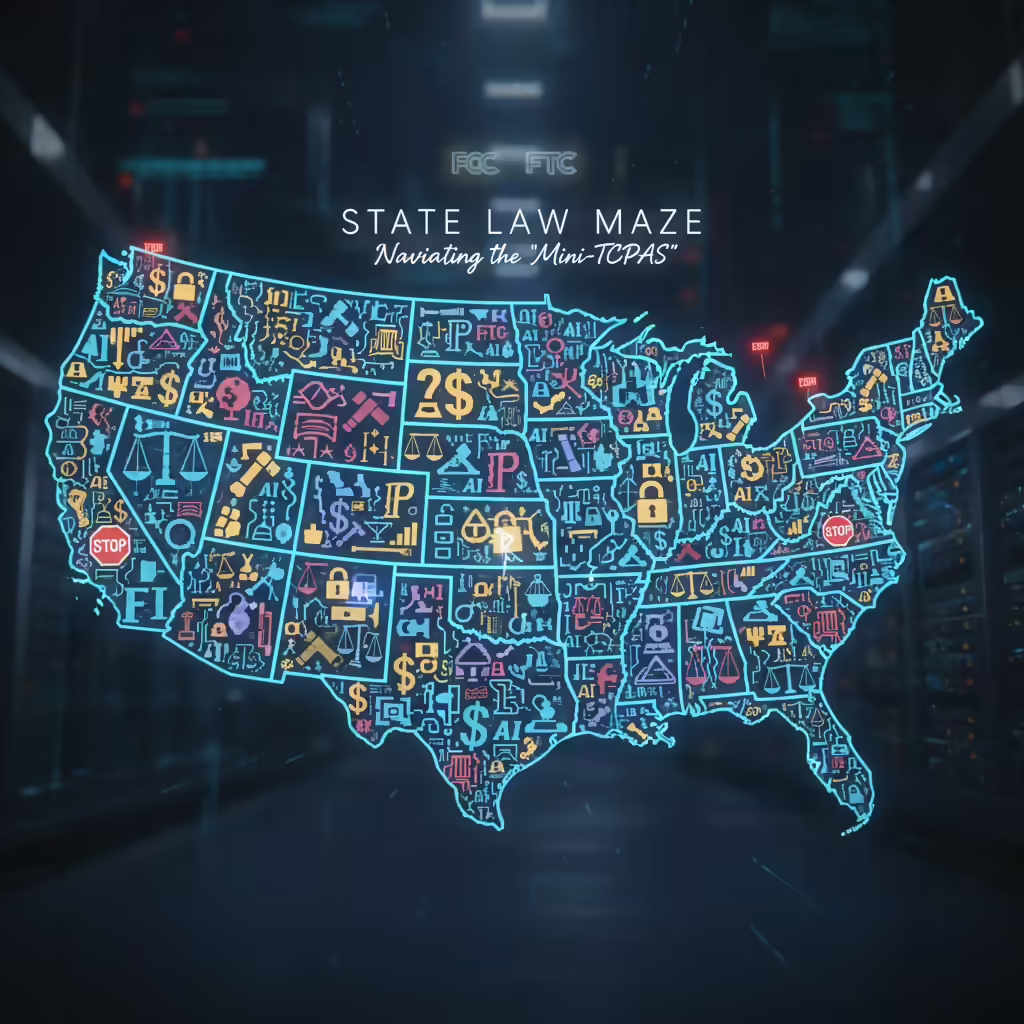
While federal regulations set the baseline, many states have enacted their own laws governing AI robocalls—often with requirements that go beyond federal standards. For sales teams operating nationally, this creates a complex compliance challenge.
Texas SB140: A Model for State Regulation
Texas Senate Bill 140, which took effect in September 2024, is one of the most comprehensive state-level AI calling laws. It includes several provisions that exceed federal requirements:
Key Provisions of Texas SB140
- Mandatory AI disclosure during calls: Callers must disclose within the first 30 seconds that the call is using AI-generated voice technology
- Prohibition on voice cloning: Using AI to clone or impersonate another person's voice without consent is explicitly illegal
- Enhanced consent requirements: Consent must specifically mention AI use and cannot be bundled with other authorizations
- Private right of action: Individuals can sue companies directly for violations, with statutory damages of $1,000-$10,000 per violation
- No preemption defense: Companies cannot claim federal law preempts state requirements
Other State Laws to Watch
Several other states have enacted or are considering similar legislation:
- California: Proposed legislation would require real-time disclosure of AI use and create a state-level registry of AI calling systems
- Florida: New rules require AI disclosure and prohibit AI calls during certain hours (before 8 AM or after 9 PM)
- New York: Pending legislation would create one of the strictest consent regimes in the country, requiring annual renewal of AI calling consent
- Illinois: Under the state's Biometric Information Privacy Act (BIPA), AI voice analysis may require separate biometric consent
Compliance Strategy for Multi-State Operations
For sales teams operating across state lines, the safest approach is to:
- Comply with the strictest standard: Adopt the most stringent state requirements as your baseline for all calls
- Implement state-specific disclosures: Use technology to detect the recipient's location and provide appropriate state-mandated disclosures
- Maintain detailed records: Document consent, disclosures, and opt-outs on a per-state basis
- Monitor legislative developments: Assign someone to track new state laws and update compliance procedures accordingly
The reality is that state-level regulation of AI robocalls is only going to increase. Sales teams need systems flexible enough to adapt to new requirements as they emerge.
Compliance Checklist: Protecting Your Outbound Sales Team
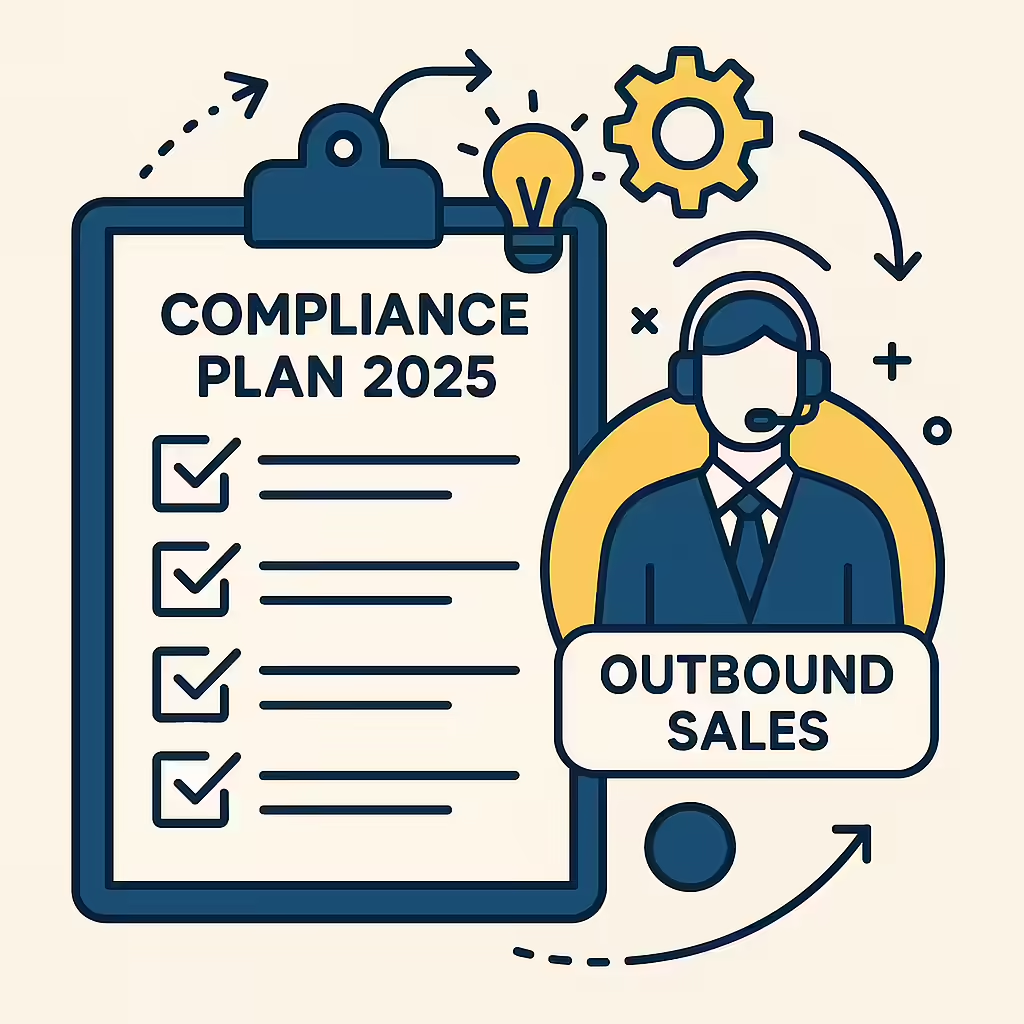
Given the complex and evolving regulatory landscape, here's a practical compliance checklist for outbound sales teams in 2025:
Audit Your Current Calling Practices
- Identify all technologies used in your calling campaigns (dialers, AI voice tools, predictive dialers, etc.)
- Determine which tools use "artificial or prerecorded voice" technology
- Review whether any AI-generated content is used in calls (even if a human initiates the call)
- Document your current consent collection process
Review and Update Consent Forms
- Ensure consent forms clearly disclose the use of AI or automated calling technology
- Use plain language that average consumers can understand
- Make AI consent a separate, explicit opt-in (not bundled with other authorizations)
- Include clear information about how to opt out
- Ensure consent forms comply with both federal and applicable state laws
Implement Robust Record-Keeping
- Maintain records of consent for at least 4 years (some states require longer)
- Document the date, time, and method of consent collection
- Store copies of actual consent forms or recordings
- Track opt-out requests and ensure they're honored immediately
- Regularly audit your consent database for accuracy
Train Your Sales Team
- Educate reps on TCPA requirements and the risks of non-compliance
- Provide clear guidelines on when and how to obtain consent
- Train on proper handling of opt-out requests
- Emphasize the importance of accurate record-keeping
- Conduct regular refresher training as regulations evolve
Establish Internal Compliance Monitoring
- Designate a compliance officer or team responsible for TCPA adherence
- Conduct regular audits of calling practices and consent records
- Monitor for changes in federal and state regulations
- Review and update policies at least quarterly
- Establish a process for quickly addressing compliance issues
Scrub Your Calling Lists
- Check all numbers against the National Do Not Call Registry at least every 31 days
- Maintain your own internal Do Not Call list and honor it permanently
- Remove numbers that have requested to opt out
- Verify that you have proper consent for all mobile numbers
- Consider using a third-party compliance service for list scrubbing
Better Alternatives to AI Robocalls

Given the regulatory risks and compliance complexity of AI robocalls, many sales teams are finding that human-powered calling with smart technology offers a better balance of efficiency and compliance.
Compliant Calling Technologies
Modern sales technology can dramatically improve calling efficiency without crossing into illegal robocall territory:
Power Dialers
Power dialers automatically dial the next number as soon as a rep finishes a call, eliminating manual dialing time. Because a human agent is always present when the call connects, power dialers are fully TCPA compliant when used properly.
Key benefits:
- Increase rep talk time by 200-300%
- No consent requirements beyond standard business calling
- Maintain the personal touch of human conversation
- Easy to implement and train
Local Presence Dialing
Local presence technology displays a local area code to the person being called, dramatically increasing answer rates. This is a compliant way to improve connection rates without using AI or prerecorded messages.
Key benefits:
- Increase answer rates by 40-100%
- No special consent required
- Works with any calling system
- Improves rep morale by reducing rejection
AI-Powered Call Analytics (Not AI Calling)
Instead of using AI to make calls, use AI to analyze calls made by human reps. This provides coaching insights, identifies successful patterns, and improves performance—all while maintaining full TCPA compliance.
Key benefits:
- Improve rep performance through data-driven coaching
- Identify successful talk tracks and objection handling
- No regulatory risk
- Enhance rather than replace human selling
Why Human-Powered Calling Still Wins
Beyond compliance considerations, there are strong business reasons to favor human-powered calling:
- Better conversion rates: Human reps can adapt to objections, read emotional cues, and build rapport in ways AI cannot
- Brand protection: AI-generated calls can feel impersonal or creepy, damaging your brand reputation
- Flexibility: Human reps can handle complex questions and situations that would confuse AI systems
- Relationship building: Real conversations create connections that lead to long-term customer relationships
The most successful sales teams in 2025 are using technology to empower their human reps, not replace them.
The Future of AI in Sales Calling
Does this mean AI has no place in outbound sales? Not necessarily—but its role is changing.
Compliant Uses of AI in Sales
There are several ways to leverage AI technology without running afoul of TCPA regulations:
- Pre-call research: Use AI to analyze prospect data and suggest personalized talking points
- Post-call follow-up: AI can draft personalized follow-up emails based on call transcripts
- Lead scoring: AI can analyze data to prioritize which prospects to call
- Call coaching: AI can analyze recorded calls and provide coaching feedback to reps
- Voicemail drops: With proper consent, AI can leave prerecorded voicemails (though this still requires TCPA compliance)
The key is using AI to support human callers rather than replace them in the actual conversation.
What to Watch in 2025 and Beyond
The regulatory landscape will continue to evolve. Key developments to monitor:
- Finalization of FCC's proposed AI consent rules: Expected in 2025, these will set the standard for AI calling consent
- Additional state legislation: More states will likely enact AI-specific calling restrictions
- Increased enforcement: Both FCC and FTC have signaled that AI robocalls are an enforcement priority
- Private litigation: Expect more class action lawsuits targeting AI calling practices
- Technology evolution: As AI becomes more sophisticated, regulators may create new categories of restrictions
Conclusion: Compliance is Your Competitive Advantage
The message from regulators is clear: AI robocalls without proper consent are illegal, and the penalties for violations are severe. For outbound sales teams, this creates both a challenge and an opportunity.
The challenge is navigating an increasingly complex regulatory environment with significant financial and legal risks for non-compliance.
The opportunity is that compliance can be a competitive advantage. While your competitors cut corners and risk massive fines, you can build a sustainable, compliant calling operation that:
- Protects your company from legal liability
- Builds trust with prospects and customers
- Creates a foundation for long-term growth
- Positions your brand as ethical and customer-focused
The most successful sales organizations in 2025 won't be those that find loopholes in TCPA regulations—they'll be those that embrace compliance as a core value and use technology to empower their human sales teams.
Key Takeaways
- AI-generated robocalls are illegal without prior express written consent under federal law
- The FCC has proposed even stricter rules requiring separate, explicit consent for AI calls
- Major enforcement actions have resulted in multi-million dollar fines
- State laws add additional requirements that vary by jurisdiction
- Human-powered calling with smart technology offers better compliance and often better results
- Compliance should be viewed as a competitive advantage, not just a legal obligation
Ready to Build a Compliant Calling Strategy?
Kixie's power dialer and local presence technology help sales teams increase productivity while maintaining full TCPA compliance. No AI robocalls, no regulatory risk—just smart technology that empowers your human reps.
Learn More About Kixie

